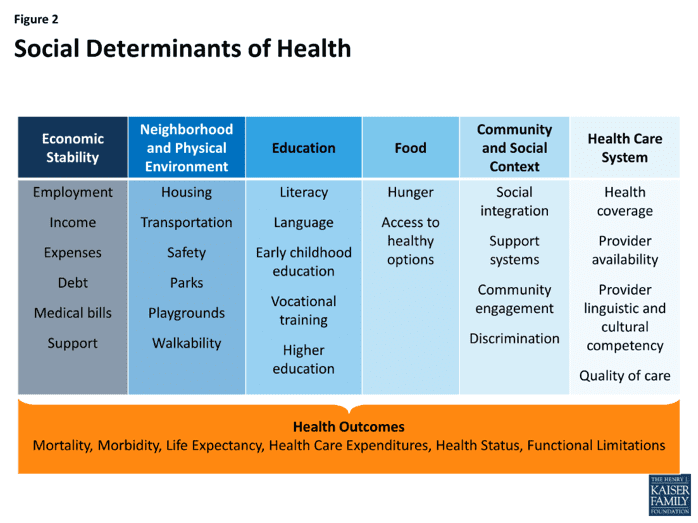Social Determinants of Health
The Response – Social Determinants of Health and the Effects of Place:
Health inequalities are avoidable and preventable, and result directly from the circumstances in which people grow, live, work, and age, and the systems put in place to deal with illness. The conditions in which people live and die are, in turn, shaped by political, social, and economic forces. When combined, the conditions and circumstances in which people are born, grow, live, work and age, determine whether they will develop their full potential and live flourishing and resilient lives, or whether their potential for success will be inhibited, constrained, and blighted.
The social determinants of health refer to the “the structural determinants and conditions in which people are born, grow, live, work and age.” They include factors like socioeconomic status, education, the physical environment, employment, and social support networks, as well as access to health care.It is estimated that 80% of chronic diseases are preventable and 70% of all premature deaths result from social factors. The social determinants of health have a profound effect on the health of individuals, families, neighborhoods, and communities.

UCity Family Zone Goals:
The UCity Family Zone is a placed-based approach in a defined geographic area (UCity), for coordinating and integrating the activities of the six partner organizations in ways that empower residents to overcome the social and health consequences of poverty. The UCity Family Zone is an Accountable Change Organization (ACO),dedicated to achieving what the Stanford Social Innovation Review calls Collective Impact (as opposed to Isolated Impact). Collective Impact Initiatives are groups of organizations which join together to solve a common social problem that none of the independent organizations is capable of solving alone. The organizations work together in true alignment to lead and achieve powerful results, by having a: 1) common agenda, 2) shared measurement systems, 3) mutually reinforcing activities, 4) continuous communications, and, 5)the support of a backbone organization.
By combining their activities and perspectives, expanding collective programming and initiatives, and measuring the effects of their actions, the UCity partners are addressing and influencing the upstream social causes of disease and disability, increasing social capital and social equity, reducing unnecessary preventable disease, and contributing to overall wellbeing in University City communities.
The specific goals of the UCity Family Zone are to:
- Improve daily living conditions – actively enhance the wellbeing of individuals and families throughout the community, by improving living, learning, and working conditions; and creating supportive neighborhood structures that promote resilience and flourishing.
- Empower local community residents – promote and advocate for equity in housing, education, health, income, social support, and hunger; expand the number and scope of community resources available to individuals and families for supporting the skill and resource acquisition needed to contribute individual and community health and social equity.
- Measure, enhance, and monitorcommunity assets and outcomes– measure the impact of individual, family, and collective actions; provide routine monitoring of progress on improving the social determinants of health in all six (6) primary domains: economic stability, education, health, community assets, housing and homelessness, and hunger.
- Implement the UCity Strategic Plan with achievable metrics in each social determinant area, so that average age of death is increased from the present 67 years to 72 years by the year 2027.